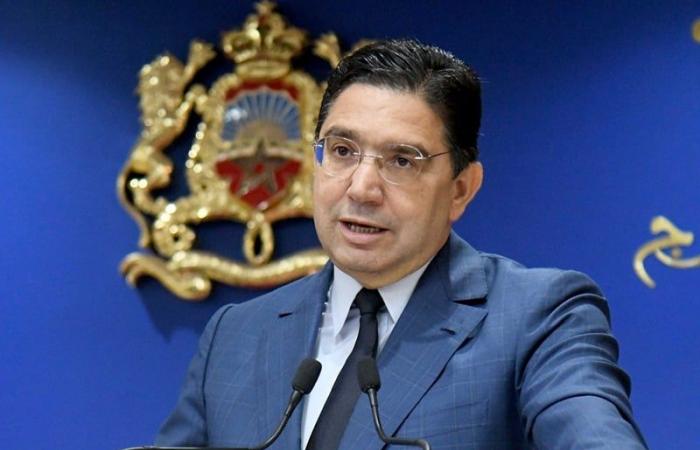During Emmanuel Macron’s state visit to Morocco, the Minister of Foreign Affairs, Nasser Bourita, gave an interview to the newspaper ” The Point » where he spoke on crucial issues affecting relations between Morocco and France, the Sahara question, the management of migratory flows, and Morocco’s efforts in the geopolitical context of the Sahel and the Middle East. Bourita reaffirmed the driving role of His Majesty King Mohammed VI in building a partnership “ exceptional reinforced » with France, marked by concrete commitments for the future.
Bourita describes the recent visit of President Macron as “ start of a new chapter » in bilateral relations, under the leadership of King Mohammed VI and Emmanuel Macron. According to the minister, this alliance is based on a “declaration of great importance” signed by the two heads of state, defining the pillars of this renewed partnership. This document, affirms Bourita, reflects a common vision based on “ equality, transparency, and shared responsibility “. In terms of projects, he cites renewable energies and the improvement of railway and port infrastructures, all sectors where Morocco sees an opportunity for integration and development with France.
The Sahara question occupies a central place in Bourita’s speech, which recalls that France now considers the Moroccan autonomy plan as the “ only base » viable for a political solution. “ France affirms that the Sahara cannot be considered outside of Moroccan sovereignty », Declares the minister, highlighting the support of more than 112 countries for the Moroccan autonomy plan. Bourita emphasizes that, despite broad international support, “ a serious and responsible partner is still missing » to unblock the situation, a clear allusion to Algeria, a key player in this regional conflict. Morocco hopes that this support from Paris, “ permanent member of the Security Council “, will strengthen its position in the negotiations at the UN.
Cooperation in migration matters: a dynamic of shared responsibility
Asked about ways to facilitate the readmission of Moroccan nationals in an irregular situation in France, Bourita describes a process “ in close coordination » with the French authorities to speed up the issuance of passes. He insists on Morocco’s desire to act with “ shared responsibility and commitment “. With a largely integrated Moroccan diaspora, Bourita specifies that it is essential to preserve this positive image of Moroccans in France, also emphasizing Morocco’s respect for its obligations regarding the return of people in an irregular situation.
In a spirit of cooperation, Morocco proposes an approach of “ shared responsibility », particularly with regard to the migration of unaccompanied minors. The minister recalls that in 2018, King Mohammed VI launched an initiative to identify Moroccan minors in France, but that French legal obstacles had slowed down their repatriation. Faced with this situation, joint initiatives are being studied to optimize the management of this problem.
On the Sahel issue, Bourita evokes the “ afro-optimistic vision » of the King, who rejects the idea of the Sahel as “ a fatality “. Since 2012, Morocco has increased development initiatives, notably through the training of more than 500 imams at the Mohammed VI Institute. The minister mentioned the Atlantic initiative, a Moroccan project intended to open up the Sahel by offering countries in the region access to Moroccan logistics infrastructure. Three ministerial meetings have already taken place in this context, illustrating strong regional enthusiasm for this initiative. “ The idea is to open up the Sahel, to get it out of its isolation », Explains Bourita, adding that France, also active in this region, could collaborate to support the stability of the Sahel.
Algeria: a firm and non-interventionist Moroccan position
Addressing relations between France and Algeria, Bourita clarifies the Moroccan position: “ Morocco does not intervene in the relations that other countries maintain with Algeria “. He emphasizes that Moroccan doctrine, dictated by the King, focuses exclusively on strengthening its own bilateral ties and does not interfere with those that its partners may have with other countries. If Algeria perceives these relations as a threat, “ this is up to his interpretation », he concludes.
Bourita also addresses the question of Moroccan-Israeli cooperation in a context marked by pro-Palestinian mobilizations in Morocco. According to him, the diplomatic relationship with Israel, reestablished in 2020 as part of the Morocco-United States-Israel agreement, does not mean Morocco’s disengagement from the Palestinian cause. On the contrary, Bourita specifies, “ Morocco strongly condemned Israeli attacks against civilians », while recalling the historic commitment of the Kingdom towards Palestine, under the aegis of King Mohammed VI, president of the Al Quds Committee. The minister underlines the Moroccan vision of a model of coexistence between Jews and Muslims, where religion does not constitute an obstacle, and reiterates that Morocco’s support for Palestine remains unchanged.
Regarding possible Moroccan mediation in the Israeli-Palestinian conflict, Bourita is cautious, believing that “ it is essential to work discreetly to promote peaceful discussions “. Morocco, faithful to its historical position, continues to support all initiatives in favor of a just and lasting peace, respecting the rights of the Palestinian people and the two-State solution.
In this interview, Bourita reaffirms Morocco’s commitment to playing a constructive role on the regional scene, whether through strong alliances with historic partners like France, or by supporting long-standing causes such as that of the Sahara. and Palestine. The minister underlines that this vision of active and responsible diplomacy is carried by King Mohammed VI, who places Morocco at the center of major contemporary issues, while remaining attached to its principles and its diplomatic heritage.






